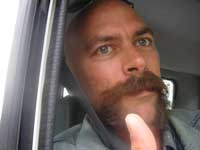Incurably Romantic
Now that's an interesting line of inquiry.
Diabolique forwarded to me an op-ed piece from the NY Times, about how the election represents a rejection of the Enlightenment values on which this country was founded. I raised this in 'talking' to one of my WorldLeathermen correspondents, a German. He pointed out that our nation was, in fact, founded by people who were products of the Protestant Reformation (those Puritans!), and so although Adams, Jefferson, and Franklin were steeped in Enlightenment thought, the bulk of the country pretty much missed out on it. Although those Not-Quite-Founding Fathers did their best to impose the Enlightenment on our newly independent nation, it was pretty much just the American upper crust that took to it. The South Carolina planters and Pennsylvania pioneers had never read their Kant.
However, one Zeitgeist that did sweep the nation was Romanticism. In Europe, that was a corrective to the cold and dispassionate spirit of the Enlightenment (the German word is 'Aufklarung,' one of my favorite German words). Those enlightened thinkers saw the human body as a complicated machine, God as a great watchmaker who had wound up Creation and let it run, and--verrrry importantly--saw humanity as 'correctible.' Just line up society like so many gears and cogs and everything would be hummming along fine.
In Europe, Napoleon was the Great Man of the Romantic movement, inspiring composers (Beethoven's Eroica) and philosophers (Hegel just about shot a load when Napoleon's armies took his university town of Jena). He was clearly not some cog in a great machine, but a passionate and moody Man of Consequence, who rewrote history rather than being subject to it.
The Romantic spirit stressed the emotions, passion, mystery, obsession, and fervor. Romantic literature is filled with images of storms, darkness, blood, and insanity. (Think Edgar Allan Poe and George Gordon Lord Byron.) There was the 'light' side of the Romantic era (Keats in the Cotswolds), but there was also the dark side. To illustrate the darker aspects of Romanticism, the college English prof of a friend of mine once showed his class Kenneth Anger's film 'Scorpio Rising,' about the Hell's Angels.
In politics, Romanticism manifested itself in violent revolution. To the barricades! Let's usher in a couple of decades of bloody, lawless upheaval! Heedless of cost and consequence, impassioned masses took to the streets and regicide became quite the thing.
Now my point, and I do have one, as half-thought-through as it might be, is that in America, we experienced Romanticism largely untempered by Enlightenment. Passion, rather than reason, has always carried the day in our political life. In choosing our leaders, we go with out guts, rather than with our heads. And no great issues have ever been decided by 'reasoned discourse.' The very framers of the Constitution hoped sincerely that we'd all be one big nation of debaters, and had a horror of the degeneracy of political parties. (Interesting to note that was shattered when that great scion of the Enlightenment, Thomas Jefferson, let his feelings get the better of him and let the agrarian-based Democrats sweep him into the presidency.)
In that book that still probably graces the back pockets of jeans of college students, Zen and the Art of Motorcycle Maintenance by Robert Pirsig, the author argues that there are two types of people in the world, Classicists and Romantics. It disintegrates in the same way that all of those 'there's-two-kinds-of-people-in-the-world' arguments always do, namely that there's a hefty dose of the Romantic in every Classicist, and lots of Classicism in every Romantic. But Pirsig is correct in that at certain times and under certain conditions, one mindset or the other certainly seems to hold sway.
And so, when the majority of Americans go with their guts, and for reasons that they're unable to articulate elect a man to the highest office in the land who does not shy from bloodshed and sure chaos when his heart tells him that that's thhe way to go, rejecting a cool, patrician man given to overly nuanced argument, those Europeans just shake their heads in wonderment. After all, they've seen where that dark, Romantic spirit can lead them. Isaiah Berlin was certain that the seeds of Totalitarianism were planted by those types who got all broody on thunderstorms and waves pounding against the shore.
Thesis, Antithesis, Synthesis. That's the model that the aforementioned Hegel set forth. In Europe, they've synthesized the Yin-Yang of Classicist Reason and Romantic strivings. We never have.
An' anuther thing. It strikes me in writing this just how steeped in the Romantic spirit is the world of leather and leathersex. Jiminy crickets! Every aspect of it! From the dim lighting in leatherbars right down to fetishes of Nazi imagery. So, in a way, we should feel right at home in this New Romantic Resurgence. It could well be that our bachanals on the shores of Lake Michigan and the hills of Pennsylvania could be on the verge of reaching their apex in years to come. Our President and senators might be comfy in the company of snake-handlers and speakers in tongues, but those same passionate urges are inspiring passions of another sort, too.
Subscribe to:
Post Comments (Atom)

No comments:
Post a Comment